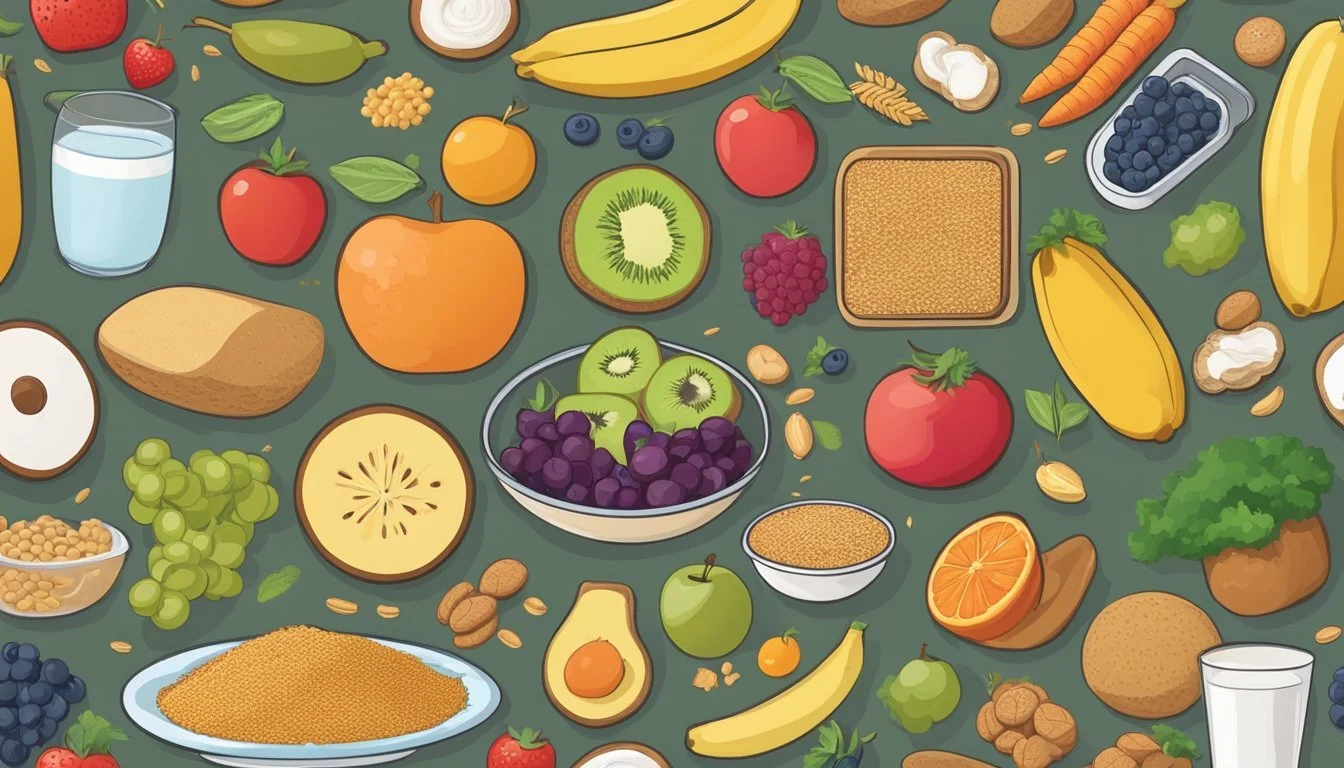Are All Natural Foods Healthy?
Unpacking the Myth
When it comes to eating healthy, the term "natural" often enters the conversation. It suggests foods that are pure, unprocessed, and inherently good for one's health. Natural foods are typically thought to be free from artificial additives, preservatives, and chemicals, bringing them closer to their state in nature. These can include fresh fruits and vegetables, whole grains, lean proteins, and healthy fats, which are all integral components of a well-rounded diet. The nutrition provided by these foods, from essential vitamins and minerals to fiber and antioxidants, supports overall health and helps reduce the risk of chronic diseases.
However, the label "natural" on food products can sometimes be misleading. Not all natural substances are beneficial for health; for example, certain naturally occurring compounds can be toxic, and an overconsumption of natural foods like salt can lead to health issues. Just because a product is branded as natural does not inherently make it a healthier choice. A balanced approach to nutrition considers the quality and quantity of natural foods, scrutinizing the broader context of an individual's diet rather than assuming that all natural products contribute positively to health.
Thus, while incorporating natural foods into one's diet can be a key aspect of maintaining a healthy lifestyle, it's important for individuals to remain informed about the nutritional value and potential health implications of these foods. By understanding that "natural" is not a synonym for "healthy," consumers can make more nuanced choices about their dietary habits and avoid the pitfalls of oversimplified food marketing. It's the nutritional content and how these foods fit into one's overall dietary pattern that determine their impact on health.
Defining 'Natural' and 'Healthy'
When consumers see terms like "natural" and "healthy" on food labels, they often have misconceptions about what these terms legally and nutritionally represent. Distinguishing between "natural," "organic," and conventional foods is essential in understanding food labeling.
The Meaning of Natural Foods
Natural foods are generally understood to be foods that do not contain artificial ingredients or preservatives and are minimally processed. However, this term is not strictly regulated by the Food and Drug Administration (FDA). No formal definition legally bounds what "natural" claims on food labels mean, which can lead to confusion and misleading impressions about the health benefits of these products.
Health Claims and Nutrition Labels
The FDA regulates health claims on nutrition labels to ensure they are anchored in scientific evidence. The term "healthy" currently has specific criteria set by the FDA, which are subject to updates as nutrition science evolves. Foods labeled as "healthy" must meet standards for nutrient content, which includes restrictions on fats, cholesterol, and sodium, among other nutrients.
Nutrition labels provide detailed information about a food's nutrient content, such as calorie count, macronutrient distribution, and presence of vitamins and minerals. Consumers are encouraged to rely on these labels rather than marketing terms when making dietary choices.
Organic vs Conventional Foods
Organic foods are regulated by certification standards that require the avoidance of most synthetic fertilizers, pesticides, and are not processed using irradiation, industrial solvents, or synthetic food additives. For a product to be labeled as organic, it must contain at least 95% organically produced ingredients.
On the other hand, conventional foods may utilize a wider range of chemicals and processing methods. While some consumers believe organic foods are inherently healthier, the nutritional difference between organic and conventional foods can vary. A food's health benefits are more accurately assessed by looking at the nutrient content rather than the organic or conventional designation alone.
Nutritional Content of Natural Foods
When considering the healthfulness of natural foods, it's important to examine their nutritional components, such as macronutrients, micronutrients, and the types of vitamins, minerals, fats, and proteins they contain.
Macronutrients and Micronutrients
Natural foods boast a diverse range of macronutrients—carbohydrates, proteins, and fats—as well as micronutrients, which include vitamins and minerals essential for body functions. Fiber, a crucial carbohydrate for digestive health, is abundant in natural foods like fruits, vegetables, and whole grains. Omega-3 fatty acids, a type of beneficial fat, are found in certain fish and plant oils, contributing to heart health.
Vitamins and Minerals in Whole Foods
Whole foods typically contain a higher vitamin and mineral density compared to processed foods. For instance, vitamin C is significant in fruits like oranges and kiwis, supporting the immune system and skin health. Magnesium, critical for muscle and nerve function, is found in nuts and seeds. Calcium, needed for bone health, is plentiful in dairy products and certain leafy greens.
Evaluating Fats and Proteins
The quality of fats and proteins in natural foods is a key factor in their overall healthfulness. Natural foods often contain unsaturated fats, which are considered heart-healthy. These include monounsaturated and polyunsaturated fats found in olive oil and avocados. Proteins are fundamental building blocks for the body and are rich in sources like lean meats, beans, and legumes, providing a complete amino acid profile.
By scrutinizing the nutritional content of natural foods—specifically their macronutrients, vitamins, and minerals—consumers can make informed decisions about their food choices and the implications for their health.
Benefits of a Diet Rich in Natural Foods
Incorporating natural foods into one's diet can contribute significantly to good health by providing essential nutrients without the added preservatives and artificial substances found in many processed foods. They are often rich in antioxidants and fiber which play a vital role in maintaining health and preventing disease.
Prevention of Chronic Diseases
Natural foods are abundant in antioxidants, compounds that protect the body's cells from damage caused by free radicals. Diets high in antioxidant-rich foods, such as fruits and vegetables, are linked to a lower risk of chronic diseases, including heart disease and certain cancers. Additionally, the high fiber content found in natural foods like whole grains can lower the likelihood of developing type 2 diabetes and aid in digestive health.
Natural Foods for Weight Management
A diet emphasizing natural foods typically contains fewer calories and a higher amount of fiber than a diet with processed foods. Fiber promotes a sense of fullness and can assist in weight management by reducing overall calorie intake. Whole fruits, vegetables, and legumes are essential components for anyone seeking to maintain or reach a healthy weight.
Boosting Energy and Good Health
Natural foods deliver sustained energy to the body, as they often have a lower glycemic index, preventing spikes in blood sugar that can lead to energy crashes. Maintaining consistent energy levels through a healthy diet that includes natural foods helps enhance overall vitality and wellness. Furthermore, the nutrients found in these foods contribute to the proper functioning of the body, supporting a robust immune system and promoting day-to-day good health.
Potential Risks and Myths
Despite the positive connotations of "natural" foods, there exist misconceptions and potential health risks associated with these products. This section examines the reality behind natural sugar content, the presence of toxins and chemicals, and the flawed belief that natural equates to always healthy.
Natural Sugar Content and Health
Natural foods can be high in sugars, such as fructose in fruit, which may affect individuals with diabetes or those watching their sugar intake. For instance, a medium-sized apple contains about 19 grams of sugar. Overconsumption of these sugars, despite their natural origin, can contribute to health issues like weight gain and dental decay.
Toxins and Chemical Presence
Natural foods are not exempt from chemicals and toxins. For example, certain fish may contain over 200 mg/kg of formaldehyde, varying with species and environment. Moreover, pesticides used in traditional agriculture can remain as residues on produce, even if naturally derived. Thus, "natural" does not automatically imply toxin-free.
The Misconception of 'Always Healthy'
The belief that anything labeled as natural is intrinsically beneficial is a common misconception. Foods like raw milk may contain less than 0.1mg/kg of formaldehyde, yet it's crucial to note that natural foods can also be part of an unhealthy diet if not consumed in a balanced manner. Their benefits are contextual rather than absolute.
The Impact of Foods on Specific Health Concerns
The relationship between diet and disease is complex, but certain natural foods play a pivotal role in the prevention and management of various health conditions. This section uncovers how specific foods may influence cancer, heart disease, and diabetes.
Natural Foods in Cancer Prevention
Cruciferous vegetables like broccoli and kale contain glucosinolates, which are sulfur-containing chemicals showing promise in cancer prevention. These compounds may reduce the risk of developing cancer by protecting cells from DNA damage and inactivating carcinogens. Fruits rich in antioxidants such as berries may also prevent cell damage that could lead to cancer.
Foods to consider: Broccoli, kale, berries, and garlic
Key components: Glucosinolates, antioxidants, and dietary fiber
Heart Health and Natural Fats
The types of fat in the diet play a crucial role in heart health. Monounsaturated and polyunsaturated fats found in nuts, seeds, and fish can help improve blood cholesterol levels and lower the risk of heart disease. Omega-3 fatty acids, a type of polyunsaturated fat, are especially beneficial for heart health as they may decrease the risk of arrhythmias and reduce blood pressure.
Foods to include: Olive oil, avocados, salmon, and almonds
Beneficial fatty acids: Omega-3s and omega-6s
Diabetes and Glycemic Control
Managing blood sugar levels is critical for individuals with diabetes. Natural foods with a low glycemic index (GI), such as non-starchy vegetables and some fruits, are metabolized more slowly and can help maintain steady glucose levels. Fiber-rich foods also play a role in glycemic control by slowing the absorption of sugar and improving blood sugar levels.
Food examples: Leafy greens, tomatoes, apples, and lentils
Noteworthy nutrients: Fiber and complex carbohydrates
Environmental and Ethical Considerations
In assessing the healthfulness of "natural" foods, one must consider their environmental impact and ethical implications, which often intersect with issues of sustainability and food production ethics.
Sustainable Food Choices and the Environment
Sustainable agriculture is crucial in maintaining environmental health. Sustainable food choices can mitigate problems such as soil erosion, contamination, and the excessive use of animal byproducts. Foods labeled as "natural" can sometimes reflect practices that are in line with environmental preservation, including:
Reduced use of synthetic pesticides which lessens soil and water contamination.
Conservation farming methods that combat soil erosion.
However, not all "natural" food production meets sustainable standards. The consumer must evaluate whether such foods adhere to practices that ensure long-term ecological balance.
Ethical Aspects of Food Production
Ethical considerations in food production encompass animal welfare, labor rights, and the potential collateral impact of farming practices on local communities. There may be an assumption that "natural" foods are produced ethically, but this is not always the case. Key aspects include:
Human labor conditions: Ensuring fair treatment and safety of workers involved in food production.
Animal treatment: Assessing the ethical treatment of animals in the production of natural foods, especially in the use of animal byproducts.
Understanding the ethical dimensions of "natural" foods involves looking beyond labels to the actual practices of food safety, animal care, and fair labor. Therefore, it's important for consumers to be informed about the origins and production methods of the foods they consume.
Selecting and Preparing Natural Foods
When choosing and preparing natural foods, consumers should focus on fresh, whole options and utilize safe storage and cooking techniques to maintain the health benefits. Understanding food choices can be the difference between a nutritious diet and one lacking in essential nutrients.
Identifying Truly Healthy Options
Fresh foods and whole foods are often synonymous with health, but not all items labeled as 'natural' guarantee nutritional value. When selecting foods, it's essential to read labels and opt for those with no added sugars, unhealthy fats, or artificial preservatives. Organic food is another category generally considered healthier; however, being organic doesn't automatically mean the food is low in calories or sugar. Consuming a balanced variety of fruits, vegetables, whole grains, lean proteins, and healthy fats ensures a well-rounded intake of essential nutrients.
Fruits and Vegetables: Choose a variety of colors to maximize nutrient intake.
Whole Grains: Look for 100% whole grain or whole wheat as the first ingredient.
Proteins: Select lean cuts of meat, poultry, fish, and plant-based alternatives like beans and legumes.
Healthy Fats: Include sources such as avocados, nuts, seeds, and olive oil.
Cooking and Storage Techniques
The way one prepares and stores food can greatly impact its nutritional quality. Cooking methods that preserve the integrity of the food, such as steaming, grilling, and baking, are preferable to frying or over-processing.
Safe cooking techniques include:
Steaming: Retains most nutrients and avoids added fats.
Grilling: Enhances flavor without needing excessive oil.
Storage tips to ensure freshness and nutrient preservation:
Refrigeration: Store fresh produce in the crisper drawer to extend shelf life.
Airtight Containers: Use these for grains, nuts, and seeds to prevent spoilage.
Adopting these strategies when selecting and preparing natural foods can lead to better health outcomes and a more satisfying eating experience.
Considerations for Different Populations
Consumers often believe that foods labeled as "natural" guarantee health benefits; however, specific dietary requirements vary among different populations. The term "natural" is not a guarantee of nutritional adequacy and should be weighed against the unique needs of groups such as pregnant women, children, the elderly, and athletes.
Nutrition for Pregnant Women and Children
Pregnant women and young children have heightened nutritional needs. They require more protein for growth and development, and iron to support blood volume expansion in pregnant women and cognitive development in children.
For pregnant women: Foods rich in iron like leafy greens and lean beef can help prevent iron deficiency anemia, a common condition during pregnancy.
For children: Protein is critical for growth, thus incorporating a variety of natural protein sources such as eggs, dairy, and lean meats is beneficial for a balanced diet.
Dietary Needs for the Elderly
The elderly population has a higher risk for nutrient deficiencies, often due to a decrease in dietary intake and the body's ability to absorb nutrients. Calcium and vitamin D are particularly important to maintain bone density and reduce the risk of fractures.
Recommended natural food sources:
Calcium: milk, yogurt, cheese, and leafy green vegetables.
Vitamin D: fatty fish like salmon and fortified natural foods.
Natural Foods for Athletes
Athletes' diets require specialized consideration to support energy needs and recovery after intense physical activities.
Protein: critical for muscle repair and growth, can be sourced from natural foods such as chicken, turkey, or plant-based options like beans and lentils.
Iron: vital for oxygen transportation in the blood, important for athletes, especially female athletes, who are at risk of deficiency due to menstrual losses.
Athletes should select natural foods that provide these nutrients without unnecessary additives to optimize performance and recovery.
Making Informed Food Choices
When individuals navigate the vast selection of food products, they are often bombarded with labels claiming health benefits. Among these, “natural” foods are frequently perceived as inherently healthy. However, the term "natural" is not strictly regulated and may not always align with nutritional quality. Therefore, consumers must approach food choices with a critical mind.
Food Labels: To make informed decisions, it is imperative to understand food labeling. A "natural" label does not necessarily mean a product is free from added sugars, sodium, or fats. It's crucial to read the nutrition facts and ingredient list rather than rely solely on marketing terms.
Processed Foods: While the word processed conjures negative connotations, not all processed foods are unhealthy. For example, pasteurized milk and frozen vegetables are processed yet retain essential nutrients. Consumers should distinguish between minimally processed foods and those with extensive processing that may add unhealthy ingredients.
Nutrient Content: Considering the nutrient content is key to evaluating healthiness:
Vitamins: Vitamins like D and C are essential, but the presence of vitamins doesn't automatically render a food product healthy.
Fiber and Calcium: Foods high in fiber and calcium contribute to a balanced diet, yet they should be consumed within the context of an individual’s overall nutritional needs.
Food Safety: Healthy food choices also involve considering food safety practices. Consumers should ensure that “natural” foods are sourced from reputable suppliers with stringent safety standards to avoid contamination.
In summary, consumers benefit from a discerning approach to food selection, prioritizing comprehensive nutrition information and food safety over simplistic marketing claims.







